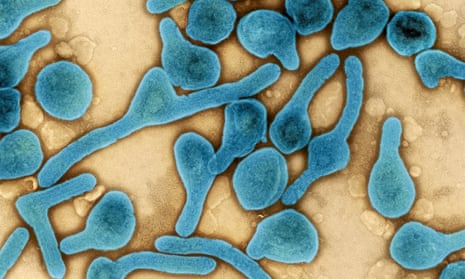Three people have died in Ghana from the Marburg virus, a highly infectious disease in the same family as Ebola for which no treatment yet exists.
So far, four cases have been detected, according to the Ghana Ministry of Health. It is the first declared outbreak of Marburg virus disease (MVD) in the country, and the second in west Africa after Guinea confirmed a case last year.
The source for the outbreak in Ghana is not yet known and the World Health Organization (WHO) is warning the often fatal disease could be a serious public health threat. Here is what you need to know.
How does the Marburg virus spread?
The virus is transmitted to people by fruit bats and can then spread from human to human via body fluids, including on contaminated clothing or surfaces, according to the WHO.
The first outbreak was recorded in 1967 in Germany after staff working at a laboratory in the town of Marburg became infected with the disease from monkeys brought in for studies from Uganda. Outbreaks since then have mostly been detected in eastern and southern Africa.
What are the symptoms?
At its early stages, after an incubation period between two and 21 days, patients can present with headache, muscle aches, fever, and chills. The virus can then cause haemorrhaging, organ failure, weight loss, jaundice, delirium and pancreas inflammation, according to the WHO. Fatal cases usually have some form of bleeding, often from multiple parts of the body.
Given early symptoms are similar to many other tropical febrile diseases such as Ebola, malaria, and typhoid, the WHO says it can be difficult to identify.
The average fatality rate for MVD is 50%. At its lowest, the fatality rate was 24% during the first recorded outbreak in Germany. However, the fatality rate reached 88% in Angola during a 2005 outbreak, resulting in 329 deaths.
According to Prof Oyewale Tomori, the president of the Nigerian academy of science and a virology expert, there is a “great deal” we don’t yet know about MVD. This includes whether infection can be caused by contact with bat droppings in caves.
What is the treatment for the virus?
There are no approved vaccines or antiviral treatments to treat MVD, according to the WHO. However, patients have a chance of survival if specific symptoms are treated, and if supportive care is provided such as rehydration with oral or intravenous fluids.
A range of treatments are being evaluated, including blood products, immune therapies, and drug therapies.
Where has it been detected?
No cases of MVD have been detected outside Africa in the latest outbreak. The three people who died from the disease had been in Ghana’s Ashanti region, the most populated part of the country.
The first two cases were not found to be epidemiologically linked, however the latest two people infected by the virus are close contacts of the index cases, according to the Ghana’s ministry of health. Extensive field investigation is underway to determine if the virus has spread further.
“This is a problem, it only takes one case and then it balloons,” Tomori told The Guardian. “It was in Guinea last year, it is in Ghana this year, it could be anywhere.”
Tomori believes MVD has long been endemic in many parts of Africa, but because of a lack of resources to detect the virus it has gone unnoticed.
What steps have been taken to contain the outbreak?
Ghana’s ministry of health is coordinating a response with aid agencies, including enhancing surveillance for the virus and epidemiological investigations. A hospital in the Ashanti region has been designated to care for any additional suspected cases.
According to the WHO, Côte d’Ivoire and Burkina Faso are also preparing for an outbreak.
